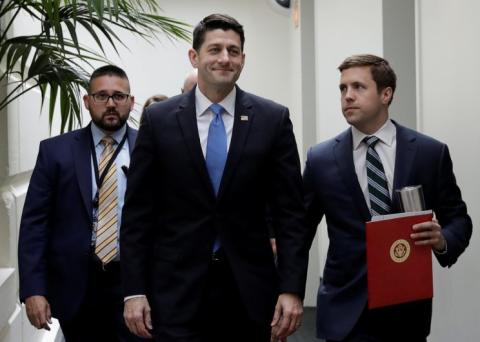Senate Majority Leader Mitch McConnell of Kentucky speaks to reporters on Capitol Hill on Tuesday. (Photo: Pablo Martinez Monsivais)
WASHINGTON — House Republicans defied the odds and narrowly passed a controversial bill to repeal and replace Obamacare on Thursday afternoon, with House Speaker Paul Ryan urging his members to seize the moment and deliver on their long-held campaign promise even before members received an estimate of the bill’s effects from the Congressional Budget Office.
It took many late night meetings, last-minute amendments and old fashioned arm-twisting to push the bill through the House, but the American Health Care Act likely faces an even steeper and more treacherous climb in the staid and slow Senate.
Factions of both moderate and conservative GOP senators are deeply skeptical of the bill for entirely different reasons, making a path forward they can all agree upon difficult to imagine. The Republicans’ bare majority — just 52 votes — means they can only lose two senators and still push a repeal through. The chamber’s Democratic senators remain firmly unified against any repeal of Obamacare.
Even if Republican senators do find that path, they are unlikely to accede to House conservatives’ demands that they return the precariously negotiated legislation back to them virtually untouched. Rep. Dave Brat, R-Va., a member of the Freedom Caucus, said Tuesday the Senate better not change the AHCA “one iota,” or risk losing support. But several Republican senators said Thursday they expected to write their own, improved bill after reviewing the House version.
“When the House passes a bill, I’ll review it and then we’ll go to work on the Senate bill,” said Sen. Lamar Alexander, R-Tenn.
“The Senate will have its own bill, I don’t think this is the final product,” Sen. Bill Cassidy, R-La., said.
Several GOP senators also expressed concerns with the rushed process in the House, which voted on the revised bill less than 24 hours after posting it. Members also voted on the bill before receiving a new Congressional Budget Office estimate of its cost and effects. A previous score from the nonpartisan office estimated that 24 million people would lose insurance coverage under the original AHCA plan over 10 years. Several tweaks were made to win over support from the Freedom Caucus, the group of hardline conservative members who balked and refused to support that version of the bill.

The Senate will almost certainly consider the bill at a slower pace, with a vote on likely happening in July at the earliest — right before the body’s monthlong August recess.
“Any bill that’s been posted less than 24 hours, going to be debated three or four hours, and not scored needs to be viewed with suspicion,” Sen. Lindsey Graham, R-S.C., said Thursday morning.
Sen. Susan Collins, R-Maine, said she wanted to see a CBO score of the House version before starting work on a Senate bill.
“It’s very difficult for me to analyze the bill in the absence of a CBO score,” Collins said.
The Senate couldn’t skip the CBO score step even if it wanted to, since the Republican leadership is attempting to pass the sweeping health care changes through reconciliation — a process that takes just a bare majority instead of 60 votes to advance. Senate rules require a CBO score for any bill passed through reconciliation.
Senate Minority Leader Chuck Schumer, D-N.Y., also seems poised to put up a fight over the reconciliation process, saying Wednesday on the Senate floor that portions of the bill “very possibly” violate the Byrd Rule, which prohibits bills that would significantly increase the federal deficit beyond a 10-year term from passing through reconciliation. Schumer argued that portions of the House bill dealing with preexisting conditions would increase the deficit.
Meanwhile, spokespeople for two Republican senators who had earlier expressed concerns that the AHCA cuts coverage for Medicaid recipients in their states say they still remained opposed. Kevin Smith, spokesman for Sen. Rob Portman, R-Ohio, said the senator “has concerns that this bill does not do enough to protect Ohio’s Medicaid expansion population, especially those who are receiving treatment for heroin and prescription drug abuse.” Ashley Berrang, spokeswoman for Sen. Shelley Moore Capito, R-W.V., said the AHCA “still does not address the concerns Sen. Capito has voiced throughout this debate.” Berrang said Capito would work to improve the bill in the Senate.
Medicaid remains a huge stumbling block for the bill going forward. The CBO estimated that the previous version of the AHCA would cut Medicaid by $880 billion over 10 years. Republican senators in states that have expanded Medicaid under Obamacare could face blowback from their constituents if they back these cuts. But keeping Medicaid expansion would likely alienate more conservative Republicans who say the government can’t afford the increased Medicaid and should repeal Obamacare altogether. Sen. Rand Paul, R-Ky., for example, opposed the previous version of the AHCA and called for a “clean repeal” of Obamacare in March with a replacement to come at a later date. Paul and other Senate conservatives like Ted Cruz, R-Texas, remain wildcards going forward.
On Thursday, Paul told reporters he had “fundamental problems” with the AHCA because it directs taxpayer money to insurance companies. But the senator said he remained open to voting yes if the bill can be changed to be more conservative. “If we can bring the bill in our direction I’m still open-minded,” Paul said.
Stock photography by Mavenvision at Alamy

Follow @mavenstark
Mavenvision Stock Imagery Featuring high quality, royaltie-free images available for purchase on Bigstock
Mavenvision Stock
Mavenimagery
Mavenmantes EyeEm collection
Madeira Beach, Florida










